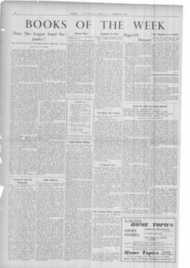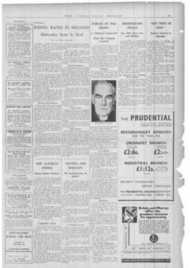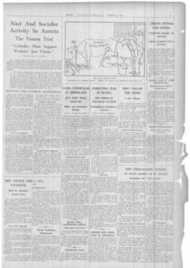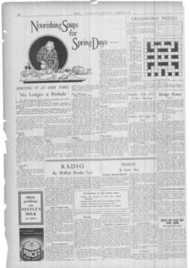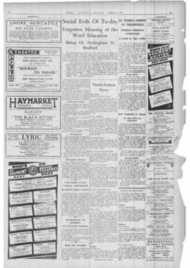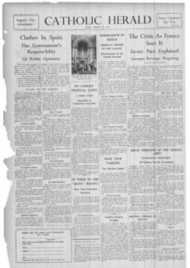Page 9, 20th March 1936
Page 9

Report an error
Noticed an error on this page?If you've noticed an error in this article please click here to report it.
Tags
Share
Related articles
Limiting Golf Clubs An American Decision
St John Fisher Parish Hosts Cardinal Murphy-o’connor Golf...
M Iss Jeanne Bisgood, Winner Of The English Ladies' Golf...
SPORTS COMMENTS
By Romany
THE CALL OF THE LINKS
With the opening of the tournament season in golf' the old controversies raise their heads inevitably.
Golf is like billiards in that it is played well by scores and badly by millions. The scores live on it, it lives on the millions. There would be no courses on which the scores could play if the millions did not pay for them.
TIGERS AND RABBITS
Any just golf legislation must be primarily in the interests of the millions. It is hard to limit the power of the few without adding to the difficulties of the many; hard, but not impossible.
At present the tendency is all in favour of running the game in the interests of the I igers.
Courses arc being stretched to satisfy their lust for length. Hoylake is so long, in preparation for the "open," that regular members boast about it in club, office and you-know-where but show an increasing tendency to accept, and even angle for, invitations to play elsewhere.
Who would blame them? Who would blame any normal golfer for wanting to get away from any course that aims at modern championship length? It is tiring to walk round let alone beat a ball round with you.
EVERYMAN'S GAME
It would be a tragedy if golf were allowed to develop into two games. It is one or its glories that "tigers" and "rabbits" both play the same game and, except where the "tigers" are sport-snobs to boot, they can, and do, play it together, with the introduction of certain novelties like "greensomes" to overcome the more obvious difficulties.
BUNK ABOUT THE BALL
There is a rampaffi resentment against any suggested change in the weight or size of the ball to limit, or restrict, the distance it will travel.
The resentment comes, we are told, from the millions. They cannot hit the ball too far, and the last thing in the world they want is a ball that won't travel.
it sounds all right until you remember that the chief difference between the tiger and the rabbit lies not in how far they hit the ball but in how they hit it. We venture to assert, and we base our assertion on fairly wide experience, that not more than one double-handicap player in ten would notice any difference between the standard ball and the lighter ball except that he seemed to play better with the latter. He does play better with it because it is not only lighter, but larger. It is easier to hit off the tee, it sits up better through the green. The difference in its length is noticeable only when it is hit perfectly. The rabbit hits a ball perfectly about once in a blue moon, and then any sort of ball goes about twice as far as usual.
If you still think a change of ball is likely to worry the rabbit, take a look at the kind and condition of ball with which he is content to play in normal circumstances and forget it.
TOO MANY TOOLS
Then there is that favourite hobby-horse of ours, the limited bag. Sandy Herd, who is celebrating a professional golden jubilee about now, agrees that many clubs are making the game too easy. But, mark you, it is too easy only for the tiger: and again, it is only the tiger who carries (or has carried for him) many clubs.
The tiger does not get half the fun out of golf the rabbit gets. The tiger never has to "show the shot." All he has to do is pick the club and be sure his swing is in its groove. If it is not he is miserable and even if it is he isn't happy. He has to beat blazes out of bogey every time or he is playing below his form. He invents "pars" and "scratch scores" and things just to irritate himself.
THE NIFTY NINETIES
The good steady "ninety" is the golfer who enjoys his golf. He has few clubs, probably because, more often than not, he carries them himself. He finds lies the tiger has never even heard about, and gets out of them in a unique manner with the wrong club, but it is a golf club in the hands of a golfer playing golf, not a specialised tool set in a machine that is functioning.
THE DECLINE TO EXCELLENCE
And think of the joy when he "breaks" ninety. He does it, too, and often. That is the real joy of the golf game, but too often it is the beginning of the end. He puts in those cards and begins to get his handicap reduced. He takes lessons. He buys a "matched set." He begins to swing, to dream about a straight left and to drivel deliriously about pivoting and the transfer of weight. If he is lucky about this time he will meet some old Scotsman who will beat the daylights out of him with half-a-dozen rusty clubs, and when asked the secret sniffs and says : "Wed, when I was a wean I thought that golf was just a case of— here's a ha*, let's hit it—and I've gone on thinking it, and it works."
OVER THE HILL
if he is unlucky he will get his handicap reduced to "scratch" or better and never know what it means really to enjoy the game again, or not until he has the courage to own up to the dawning realisation that courses seem longer than they did, that a rest and a refresher are useful at the ninth that when nobody is looking there is virtue in a ladies' tee. and that fifteen holes is about enough. The happy handicap is in double figures or near them, and let who will worry about vast distance and the grooved swing.
" NUDGER"
Ernest "Nudger" Needham is dead. Sixty-three years of age, he died in his
native county at Chesterfield, but though he played good, solid, reliable, middle of
the innings cricket for Derbyshire for ten or a dozen years, it will be as a footballer that he will be remembered and his prowess recalled wherever men meet and recall the palmy days that marked the
century's change.
From 1891 to 1911 "Nudger" played for Sheffield United. Sixteen times he was "capped" for England, seven times against Scotland. He had three cup final
medals, two of them winners.
He was short-medium, stocky and
knobby; never showy but terribly efficient. He did the work of three neen and seldom caught the eye of any but the shrewdest judges. -When England had G. 0. Smith and "Tip" Foster, W. J. Oakley and Steve Bloomer to pick, it is safe to bet that Needham's name was about the first to go down on the certainty list,
"Nudger" was never beaten, he always came back, you might pass hint and leave him behind and before you were into your stride you were falling over him again.
A redoubtable Scottish forward was having a disappointing match. "What's wrong, Bobbie?" asked a colleague as they left the field at half-time.
"Wrang? It's a' that — wee limpet."
LEWIS v. McAVOY
John Henry Lewis did not learn to be a world champion while teaching in a Sunday school. That negro can box. If the world does not know it, Jock McAvoy does. The Rochdale lad lost the chance of being the first British world cruiserweight champion for thirty-three years to a better boxer. A better man than Jock McAvoy must be good.
STRAIGHT LEFT
The fight in Madison Square Garden, which is not a garden and not in Madison Square, was the customary clash in styles with the positions reversed. McAvoy did the typically American tearaway stuff; the typically English straight left poke won the fight for Lewis.
McAsoy was giving away height, weight and age. His only hope lay in a knock-out. He tried for it, tried valiantly and failed. He ran into that terribly efficient straight left pretty nearly every time, and there is nothing more disconcerting.
POINTS IN U.S.A.
For a long time it has been fairly safe to say that, in an important fight in America, no Englishman will ever get a verdict except on a knock-out. That is still true to a certain extent, but less true now than it was not so long ago. It still takes almost a surgical operation to get an American judge to give a verdict against an American, of whatever race, creed or colour, in an important fight. Unimportant build-up lights do not count; if you are in a position to know anything you know the result before the fight begins.
EARL'S COURT
In this case Lewis won on points and presumably on his merits, though we would have felt more comfortable about it if there had been a knock-out, and there was never anything remotely like one. McAvoy lost a good fight well. Perhaps he learnt something. He is likely, on St. George's day, to be in the same relation to Petersen as he was last week to Lewis, when the fight begins.
Petersen is taller, heavier and younger, and, as Len Harvey will tell you between his operations, holidays and film engagements, Petersen has a straight left. If we get as good a show at Earl's Court as they had at the Garden, nobody except the loser will care a lot who wins.
blog comments powered by Disqus





